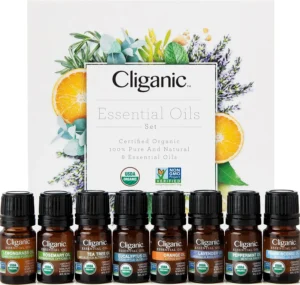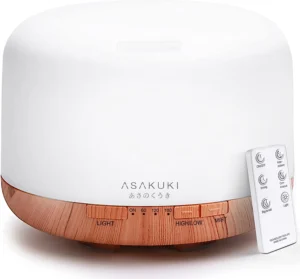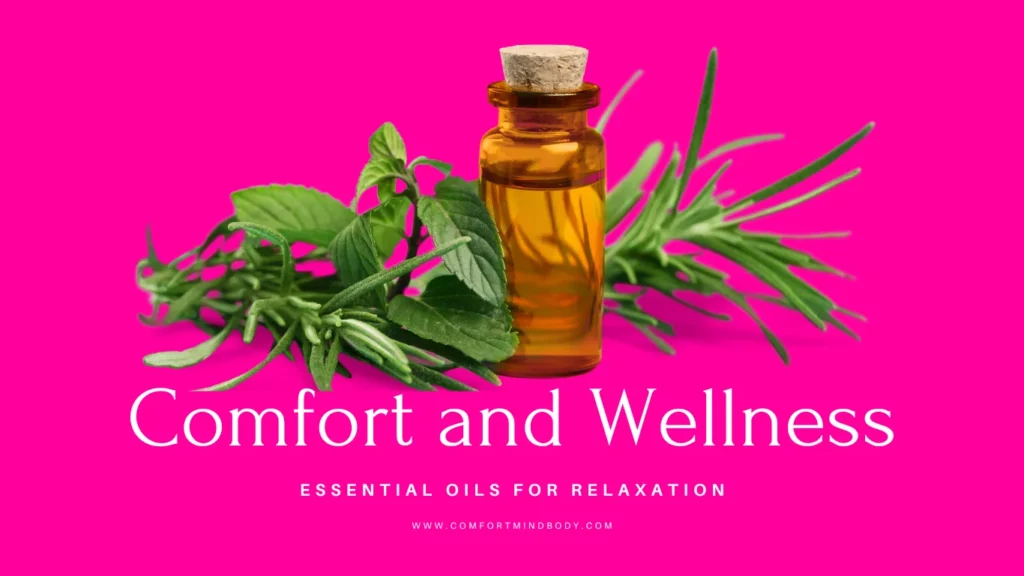Table of Contents
ToggleGuide
Essential Oils for Relaxation. In the bustling world we live in, finding peaceful moments of tranquility can be a challenge. For many, the answer to this struggle has been found in the subtle, aromatic world of essential oils.
Essential oils come from plants. They are natural compounds with many uses, like skincare and cleaning. However, their best use may be for relaxation.
Essential oils have been used for centuries in various cultures, from ancient Egypt to modern aromatherapy clinics. They are made using methods like distillation or cold pressing.
This creates a concentrated oil that holds the scent and benefits of the plant. These oils can be used in many ways. You can diffuse them, apply them to your skin, or even ingest them. It all depends on the type of oil and how you plan to use it.
The power of essential oils lies in their versatility and effectiveness. They can be easily incorporated into daily routines, providing a natural option for those seeking serenity and relaxation.
Why Essential Oils for Relaxation?
Turning to essential oils for relaxation is a natural progression of their use. The calming properties of many oils make them ideal for promoting relaxation and reducing stress levels. Oils like lavender, chamomile, and ylang-ylang can soothe and calm the mind and body.
Furthermore, essential oils are a natural and holistic alternative to synthetic relaxation aids. They work with the body rather than against it, helping to promote overall wellness and balance. If you want a natural way to relax and reduce stress, essential oils are a great option.
Finally, using essential oils for relaxation can be a highly personal and customizable experience. There are many types of oils to choose from. People can try different scents and benefits to find what they like best.
This ability to tailor the experience makes essential oils a popular choice for personal relaxation practices.
Health Benefits of Essential Oils
Aside from their relaxation benefits, essential oils also offer numerous health benefits. Some oils, like peppermint and eucalyptus, can help with breathing problems. Others, such as tea tree and lemon, are known to fight germs.
Numerous studies have also shown the potential of essential oils in promoting mental health. Oils like bergamot and frankincense can help reduce anxiety and depression. Rosemary and peppermint may improve brain function.
Moreover, essential oils also possess various skin health benefits. Oils like lavender and chamomile can calm skin irritations. Other oils, like frankincense and sandalwood, can help skin stay firm and reduce wrinkles.
Understanding Essential Oils for Relaxation
When it comes to using essential oils for relaxation, understanding the unique properties of each oil is crucial. For example, lavender is famous for helping people relax and sleep. Bergamot is known to lower anxiety and stress.
It’s also important to understand that different oils can evoke different reactions in different individuals. For instance, while one person might find the scent of rosemary relaxing, another might find it stimulating. Therefore, it’s crucial to experiment with different oils to find what works best for you.
Finally, it’s also worth noting that while essential oils can be incredibly beneficial, they should be used responsibly. Using too much or the wrong way of essential oils can cause bad reactions. It is important to follow the instructions and talk to a healthcare professional if needed.
How Essential Oils Promote Relaxation: The Science Behind
The ability of essential oils to promote relaxation is not just anecdotal but is backed by science. When you breathe in essential oils, their scents connect with the olfactory system in your brain. This system is linked to the limbic system, which controls emotions, memory, and some body functions.
This interaction causes the body to respond. It releases calming chemicals like serotonin or endorphins. This helps promote relaxation. Some oils can also affect the body’s systems, like the nervous system. This can make their relaxing effects even stronger.
This mix of physical and mental effects makes essential oils a strong tool for relaxation and stress relief.

Cliganic Organic Aromatherapy Essential Oils
- Certified Organic – Cliganic organic essential oils are proudly USDA organic certified to ensure ultimate quality and integrity.
- 100% Pure, Single Ingredient Oils – Cliganic organic essential oils are a single-ingredient product. No synthetic additives, ever.
Top Essential Oils for Relaxation
Exploring essential oils for relaxation reveals many options. These oils can improve our well-being and help us feel calm and peaceful. Lavender, chamomile, and ylang-ylang are well-known for their calming effects. However, many other oils have unique scents and health benefits worth exploring.
Lavender, with its delicate floral scent, is renowned for its calming and sedative effects. Its smell can help reduce anxiety and improve sleep. This makes it a popular choice for relaxation and stress relief. Chamomile has a gentle, apple-like smell. It is known for its calming effects. It helps reduce tension and promotes relaxation.
Ylang-ylang has a rich, sweet, and exotic scent. It is often used in aromatherapy to help create a feeling of calm. It can help lower blood pressure and reduce anxiety. This makes it a great option for relaxation and a calm mind.
Bergamot is an oil from the rinds of citrus fruits. It has a refreshing and uplifting smell. It is recognized for its stress-reducing properties, as it helps to alleviate tension and uplift mood. Bergamot is often used in blends designed to promote relaxation, balance emotions, and relieve anxiety.
Cedarwood, with its warm and woody aroma, is valued for its grounding and calming effects. It can help create a sense of stability and tranquility, making it an excellent choice for relaxation practices. Cedarwood is often used to alleviate stress and promote a meditative state of mind.
Frankincense is an ancient oil with a long history. It has a deep, resin-like scent that is calming and uplifting. It is known for its ability to promote deep relaxation, calm the mind, and enhance spiritual experiences. Frankincense is often used in meditation practices to create a serene and sacred atmosphere.
Geranium, with its sweet and floral aroma, is celebrated for its balancing and calming properties. It can help alleviate anxiety, promote emotional stability, and create a harmonizing atmosphere. Geranium is often used in blends aimed at promoting relaxation and emotional well-being.
Sandalwood, revered for its rich, warm, and woody fragrance, is highly valued for its relaxing and grounding effects. It can help calm the mind, reduce stress, and promote a sense of inner peace. Sandalwood is often used in meditation and spiritual practices to deepen relaxation and enhance focus.
These oils represent just a fraction of the many essential oils available for relaxation. Exploring the unique scents and healing properties can lead to relaxation and well-being. This helps people find the aromas that connect with them and support their path to peace.
How to Use Essential Oils for Relaxation
There are many ways to use essential oils in relaxation practices. This lets you customize your experience to fit your needs and preferences. Here are some common methods of using essential oils for relaxation:
Diffusion: Diffusing essential oils is a popular method that involves dispersing the oil into the air using a diffuser. This allows the aroma to fill the room, creating a calming atmosphere. You can choose diffusers that use ultrasonic technology, heat, or reed sticks to disperse the oils. Experiment with different oil combinations to find your preferred scent and diffusion duration.
You can apply some essential oils to your skin. Make sure to dilute them with a carrier oil, like jojoba oil or sweet almond oil. This method is suitable for oils that have skin benefits or for localized relaxation. Common areas for application include the temples, neck, wrists, or the soles of the feet. Always perform a patch test and follow appropriate dilution guidelines to avoid skin sensitivity.
Bathing and Showering: Adding essential oils to your bathwater or incorporating them into your shower routine can enhance relaxation. For baths, mix a few drops of essential oil with a carrier oil or an unscented bath gel before adding it to the water. This allows the oil to disperse evenly. In the shower, you can put a few drops of oil on a washcloth. You can also use shower steamers with essential oils to enjoy their calming scents.
Massage: Essential oils can be used during massages to promote relaxation and release tension. Mix a few drops of essential oil with a carrier oil. You can use coconut oil or grapeseed oil. Apply this mixture during self-massage or when getting a professional massage. The combined effects of the aroma and the gentle massage can enhance relaxation and overall well-being.
Remember to always follow safety guidelines and use high-quality, pure essential oils. Everyone reacts differently to essential oils. It’s best to start with small amounts and see how your body responds. If you have health concerns or are pregnant or nursing, talk to a healthcare professional before using essential oils.

Premium, Essential Oil Diffuser with Remote Control
This ultrasonic essential oil diffuser is an amazing multi-functional aromatherapy device unlike any other you’ve ever used. It features a large and easy to clean 500ml water tank, 7 LED light colors, multiple mist nebulizer modes and remote control, as well as a safety auto-switch that prevents it from overheating in case it runs out of water.
Essential Oils for Health: Additional Benefits
Sure! Essential oils are well-known for helping you relax and for their many health benefits. Here are some examples of how essential oils can offer additional advantages to overall well-being:
Cognitive Enhancement: Certain oils, such as rosemary and peppermint, have stimulating and invigorating properties that can improve focus, concentration, and mental clarity. Breathing in these oils or using them in a diffuser can help improve brain function and raise energy levels. This makes them great for studying or work.
Immune Support: Essential oils like tea tree and eucalyptus have properties that fight germs and viruses. They can help strengthen the immune system and protect against harmful pathogens. These oils can be used to clean the air. They can also be added to natural cleaning products for a healthier home.
Skin Health: Many essential oils offer benefits for maintaining healthy skin. Frankincense and sandalwood are known to help skin stay elastic. They can also reduce wrinkles and fine lines. Lavender and chamomile have soothing properties and can help calm irritated skin and promote healing. Tea tree oil is famous for its antibacterial qualities. People often use it to treat blemishes and skin problems.
Respiratory Support: Essential oils such as eucalyptus, peppermint, and tea tree are commonly used to support respiratory health. Their expectorant and decongestant properties can help relieve nasal congestion, ease coughs, and support clearer breathing. Inhalation methods like steam inhalation or using a diffuser can be effective in reaping these respiratory benefits.
Mood Enhancement: Beyond relaxation, essential oils have the potential to influence mood and emotional well-being. Oils like citrus (like lemon or orange) and floral scents (like jasmine or neroli) can lift your mood. They help reduce stress and promote a positive mindset. These oils can be diffused, used in personal inhalers, or added to bath and body products.
It’s important to remember that essential oils can provide health benefits. However, they should not replace professional medical advice or treatment. If you have health concerns, it’s best to talk to a healthcare professional before using essential oils for therapy.
Buying Guide: Essential Oils for Relaxation
You’ve highlighted some crucial considerations when purchasing essential oils for relaxation. Let’s further explore these important factors in more detail:
Quality: When it comes to essential oils, quality is of utmost importance. Look for oils that are labeled as “100% pure” or “pure therapeutic grade.” These labels indicate that the oil is free from synthetic additives, dilution with carrier oils, or other contaminants. Pure oils ensure that you are getting the full range of therapeutic benefits without compromising on quality.
Source and Harvesting: Source and harvesting practices play a significant role in the quality of essential oils. Opt for oils derived from plants grown in their natural habitat and harvested at the appropriate time. Plants grown in their native regions tend to have a higher concentration of beneficial compounds. Additionally, consider oils that are sustainably sourced and harvested using environmentally conscious practices.
Extraction Method: Different extraction methods can impact the quality and potency of essential oils. Common extraction methods include steam distillation and cold pressing. Steam distillation is often used for extracting oils from flowers and leaves, while cold-pressing is employed for citrus oils. Understanding the extraction method used can provide insights into the overall quality of the oil.
Packaging: Essential oils are sensitive to light and heat, which can degrade their quality over time. Look for oils that are packaged in dark glass bottles, such as amber or cobalt blue, as they provide protection against UV light. This helps to preserve the oil’s potency and extend its shelf life. Avoid oils that are packaged in clear or plastic containers, as they are more prone to light exposure.
Reputation and Reviews: Research the brand’s reputation and check customer reviews before purchasing essential oils. Look for companies that commit to quality, sustainable sourcing, and transparency in their manufacturing processes. Reputable brands often provide detailed information about the oil’s origin, testing methods, and purity standards.
Remember, essential oils are very strong. It is important to use them carefully and follow the right guidelines. If you have any health concerns, please talk to a qualified aromatherapist or a healthcare professional. It’s important to get advice before using essential oils.
Journey of Personalization
Essential Oils for Relaxation
In the realm of essential oils, personalization is key. Each person’s path to relaxation is different. Finding the oils that appeal to our senses and meet our needs is a personal journey. Trying out different oils and learning about their effects helps us create a relaxation routine.
This routine nourishes our mind, body, and spirit. The scents help us feel calm. We use them in ways that please our senses. Blends can lift our spirits. These are the tools we use to create a relaxing space.
A Symphony of Senses
Aromatherapy is the art and science of using fragrant plant oils. It engages our senses to promote healing and relaxation. When we breathe in essential oils, their molecules interact with our sense of smell. This stimulates the brain’s limbic system.
The limbic system is closely connected to our emotions, memories, and how we respond to stress. This profound connection allows essential oils to influence our mood, alleviate stress, and induce a state of deep relaxation.
Bathing and Showering: Immersing in Serenity
Creating a Relaxing Bath Experience: Taking a bath can change your mood. It offers a place where stress fades and relaxation shines. To enhance your bath time and create an oasis of tranquility, consider the following elements:
a. Set the Ambiance: Dim the lights, light scented candles, and play soft, soothing music to create a calming atmosphere. b. Temperature Matters: Adjust the water temperature to your preference, opting for warm water that comforts and soothes. c. Additions for Your Bath: Use aromatic bath salts with essential oils. They help you relax and nourish your skin. d. Soak and Surrender: Let yourself relax in the warm bath. Feel the stress of the day fade away as you find peace.
Shower Steamers and Their Benefits: If you like taking refreshing showers, you can still enjoy essential oils. Shower steamers are a great way to do this. These small, effervescent discs are designed to release the scents of essential oils when in contact with water and steam. Here’s why shower steamers are a delightful addition to your routine:
a. Aromatherapy on the Go: Shower steamers make it easy to enjoy aromatherapy every day, even when you’re busy. b. Uplifting and Energizing: Choose refreshing oils like peppermint, eucalyptus, or citrus blends. These oils can wake up your senses and boost your energy. They provide a great start to your day. c. Relax with Every Breath: Choose calming scents like lavender, chamomile, or ylang-ylang. These scents can make your shower feel like a spa. They help you relax and reduce stress.
Bath and Shower Oil Recipes: You can improve your bath or shower with custom oils. These oils let you choose scents and benefits that you like. Here are a few recipe ideas to get you started:
a. Calming Lavender Bath Oil:
- 1/2 cup carrier oil (such as sweet almond or jojoba oil)
- 10 drops of lavender essential oil
- 5 drops chamomile essential oil Mix the carrier oil and essential oils in a glass bottle. Add a few tablespoons to your bathwater for a soothing and relaxing soak.
b. Energizing Citrus Shower Oil:
- 1/4 cup carrier oil (such as grapeseed or coconut oil)
- 10 drops of sweet orange essential oil
- 5 drops of lemon essential oil. Mix the carrier oil and essential oils in a small bottle with a flip-top cap. Before stepping into the shower, apply a small amount to your skin and let the steam release the refreshing citrus scents.
c. Balancing Rose and Geranium Shower Oil:
- 1/4 cup carrier oil (such as apricot kernel or avocado oil)
- 7 drops of rose essential oil
- 7 drops geranium essential oil Mix the carrier oil and essential oils in a glass bottle with a dropper. Put a few drops on your body before or during your shower. This will help you enjoy the nice scents and benefits for your skin.
Conclusion: Incorporating Essential Oils into Your Relaxation Routine
Indeed, incorporating essential oils into your relaxation routine can be a transformative experience for your overall well-being. You can learn about the unique qualities of each oil. Try different mixes and methods to use them. This will help you create a relaxing practice that feels personal and rewarding.
Discover the benefits of aromatherapy by exploring different essential oils. Focus on their unique advantages and scents. Take the time to understand how each oil affects your mood, emotions, and physical sensations. Allow yourself to be open to the subtle yet profound effects that essential oils can have on your mind, body, and spirit.
Make a routine for your relaxation practice. You can diffuse oils in the morning to start your day positively. Apply a calming blend before bed to help you sleep well. Enjoy a nice bath with your favorite oils to relax and let go of stress.
As you embark on this aromatic journey, remember to use essential oils responsibly. Follow proper dilution guidelines, heed safety precautions, and respect individual sensitivities. If you have any concerns or health issues, talk to a trained aromatherapy professional or a healthcare provider.
Enjoy the process of discovering your personal favorites and finding the oils that resonate with you. Enjoy the calm and relaxation that essential oils can add to your life. They support your well-being naturally. Make essential oils a key part of your self-care routine. Their calming scents and healing properties can help you relax and feel deeply peaceful.
Affiliate Disclosure:
The links contained in this product review may result in a small commission. This goes towards supporting our research and editorial team and please know we only recommend high-quality products.
Note: This article is for informational purposes only and is not intended to diagnose, treat, or cure any disease. Always consult a healthcare professional before taking any supplement or making any changes to your diet or lifestyle.




